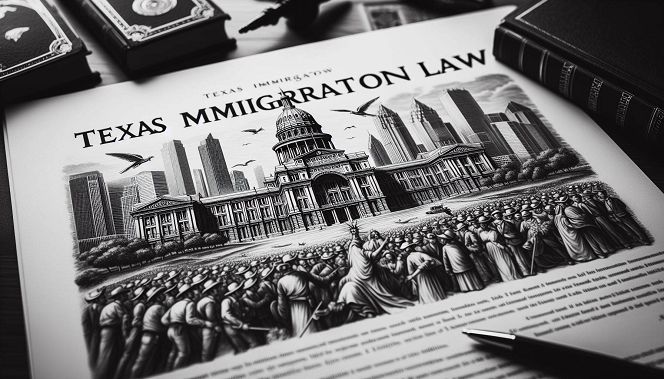Texas, the Lone Star State, stands at the crossroads of immigration policy. With its vast border stretching along the Rio Grande, Texas grapples with questions of sovereignty, security, and compassion. Senate Bill 4 (SB 4), a contentious piece of legislation, has thrust Texas into the national spotlight. As the legal battles rage on, let’s delve into the heart of Texas immigration law and explore its impact on both migrants and the fabric of American society.
The Battle Lines Drawn: SB 4 Unveiled
In 2023, Texas lawmakers approved Senate Bill 4, a bold move that reverberated far beyond state lines. What does SB 4 entail?
- Criminalizing Border Crossings: SB 4 makes it a state crime to cross the Texas-Mexico border between official ports of entry. If a police officer suspects someone of illegally crossing the Rio Grande, that person could face a Class B misdemeanor, carrying up to six months in jail. For repeat offenses, the stakes escalate to a second-degree felony, with a potential 20-year prison sentence.
- Enforcement Challenges: The law has faced legal challenges from the U.S. Justice Department and immigration advocacy groups. Federal courts have repeatedly blocked its enforcement, leaving Texas caught in a legal tug-of-war.
- Who Gets Arrested? SB 4 empowers police to question and arrest anyone they believe entered Texas from Mexico without proper authorization. The law aims to target recent border crossers rather than long-standing undocumented residents.
The Clash of Jurisdictions
At the heart of the matter lies a fundamental question: Who controls immigration in the United States? Traditionally, the federal government has held this authority, regulating who enters the country. However, once immigrants set foot on American soil, local jurisdictions play a pivotal role in shaping their lives. Some cities and states adopt immigrant-friendly policies, while others impose restrictions and monitoring.
Texas, like a defiant cowboy, seeks to blur these lines. By intruding on federal immigration powers, it challenges the status quo. But what are the implications?
- Immigrant Lives in the Balance: SB 4’s enforcement could impact countless lives. Families torn apart; futures uncertain—these are the stakes.
- Foreign Policy Ripples: Texas’ stance reverberates globally. It sends a message about America’s openness or lack thereof.
The Historical Echoes
Before the Civil War, Congress had minimal involvement in immigration regulation. Reconstruction changed the landscape. The Fourteenth Amendment defined national citizenship, assimilating immigrants regardless of background. Ironically, this federal expansion also allowed for immigration restrictions.
Texas Immigration Law: A Complex Landscape at the Crossroads
Texas immigration law stands as a microcosm of the national debate, a battleground where federal authority clashes with state ambitions. Straddling the vast border with Mexico, Texas grapples with issues of sovereignty, security, and compassion. At the center of this legal storm sits Senate Bill 4 (SB 4), a controversial piece of legislation that has thrust Texas into the national spotlight.
SB 4: Unpacking the Texas Immigration Law
Enacted in 2023, SB 4 has become synonymous with Texas immigration law. Let’s dissect its key features:
- Criminalizing Border Crossings: SB 4 makes it a Texas immigration crime to cross the border between official ports of entry. Police can arrest individuals suspected of illegal entry, potentially leading to jail time for repeat offenses.
- Enforcement Challenges: The law has faced fierce legal opposition from the U.S. Department of Justice and immigration rights groups. Federal courts have repeatedly blocked its enforcement, leaving Texas locked in a legal tug-of-war.
- Who Gets Arrested?: While SB 4 targets recent border crossers, it empowers police to question and arrest anyone they suspect entered Texas from Mexico without authorization. This broad scope raises concerns about racial profiling and potential infringement on federal immigration authority.
Clash of Jurisdictions: Federal vs. State Control
The core question at stake in Texas immigration law is one of jurisdiction. Traditionally, the federal government has held primary control over immigration, regulating who enters the country. However, once immigrants are within U.S. borders, local jurisdictions play a significant role in their lives. Cities and states can choose to adopt welcoming policies or implement stricter measures.
Texas, the Maverick State: With SB 4, Texas throws a wrench into this delicate balance. By criminalizing border crossings and empowering state police, Texas seeks to exert greater control over immigration enforcement, a power traditionally held by the federal government. This intrusion into federal authority raises questions about the future of immigration policy and the delicate balance between federal and state power.
Beyond Legalities: The Human Impact
The potential consequences of Texas immigration law extend far beyond courtroom battles. SB 4’s enforcement could have a profound impact on countless lives:
- Immigrant Communities: Families could be torn apart, with undocumented immigrants facing arrest and potential deportation.
- Foreign Policy: Texas’ stance on immigration sends a message to the world, potentially impacting international relations.
- The American Tapestry: The debate surrounding Texas immigration law reflects a broader struggle within American society regarding openness, national security, and the rights of immigrants.
Echoes of the Past: A Historical Perspective
Understanding Texas immigration law requires a glance back in time. Before the Civil War, the federal government played a minimal role in immigration. Reconstruction ushered in a shift, with the Fourteenth Amendment defining national citizenship and paving the way for federal immigration restrictions. Ironically, this expansion of federal power also allowed for limitations on immigration based on race and origin.
Conclusion: The Future of Texas Immigration Law
As the legal battle over SB 4 rages on, Texas immigration law remains a complex and evolving landscape. It embodies the struggle for control, compassion, and the very essence of the American dream. Texas, with its fiercely independent spirit, stands firm at the border, wrestling with the ghosts of historical immigration policies and the promise of a more inclusive future.





